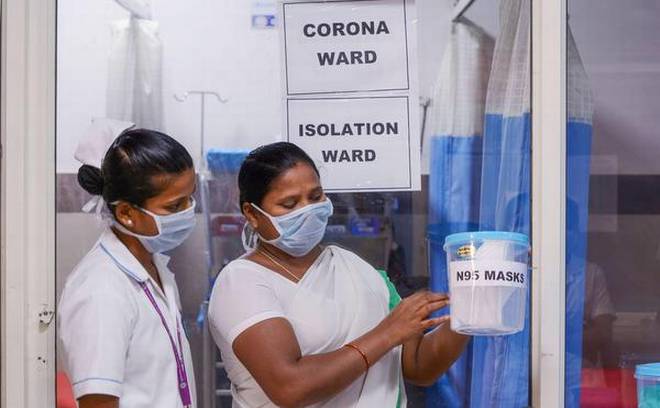Nursing schools or training institutes are mostly run by cronies of politicians.
After adopting the long overdue New Education Policy, the Centre should pay its attention to another long overdue area—of nursing education and the quality of institutions which impart it. The ongoing Covid-19 pandemic has exposed many fields in India which were either wholly unprepared or unprepared to deal with a health crisis of this magnitude.
Our country is currently dealing with the shortage of nurses and paramedics and needs to address the issue at two levels: First, to improve the quantity of nurses to meet the emergency situations like this and, second, to improve the quality of the workforce that is woefully inadequate to face the present challenge. Only now we are realising the gaps in the nursing profession in our country.
Though the situation is uniformly worrisome across the country, here I will confine to the situation in the southern states. There is a shortage of doctors in the public healthcare system; the acute shortage of nurses and paramedics is too severe to affect the entire system. The primary health centers (PHCs) in Telangana, Andhra Pradesh, Karnataka and Tamil Nadu are running with just 28% nursing staff.
Needless to say, our public healthcare system depends on the availability of nurses, both female and male, who deal with Out Patients (OP). Administration of injections and vaccines is a major part of OP wards in PHCs and tertiary hospitals. Sadly, 72% of this activity is done by untrained or other substitutes, like ward boys or auxiliary nursing midwives (ANMs).
The Covid crisis has exposed the seriousness of this shortage of nurses in our hospitals, mostly government run, as they were the designated centers in the beginning. Though there are vacant beds in hospitals, patients could not be admitted due to shortage of doctors and nurses. There has been no response to repeated job advertisements issued by the health departments to fill the nurse posts.
The same is the case with private hospitals too. Sources from the hospital administrators, both public and private ones, say that not just the availability of nurses and paramedics, but also their quality or readiness to tackle the pandemic cases is far from satisfactory. A major reason for this is the poor quality of their training and social stigma attached to the nursing profession as such.
In India, there are 30 lakh registered nurses and midwives, but only half of them are currently available, as the rest have either migrated abroad, mostly Gulf countries, or retired.
Not all the estimated 15 lakh nurses are prepared to tackle a pandemic like this now. A majority of them are trained only as midwives or assistants to doctors. Now we need more nurses who can fight epidemics or pandemics.
According to a recent estimate by the Union Health ministry, India needs at least 20 lakh more nurses and ANMs to upgrade our public healthcare system. If the WHO (World Health Organization) norms say one nurse is needed for every 1,000 population, in India it is around 1:10,189. Even in terms of beds, we have only one nurse for every 483 beds, so we can imagine the level of stress the nurses undergo.
Kerala sends a big number of nurses every year, but most of them prefer to go to Gulf countries or the US and Canada. Still, PHCs in Kerala are better staffed with nurses and ANMs than other neighbouring states like Tamil Nadu and Karnataka. Ironically, Karnataka has a higher number of nursing schools in the country–314 BSc (Nursing) colleges with 15,000 seats, but a very few prefer the state.
Tamil Nadu has 132 BSc (N) schools, with 7,265 seats, Andhra Pradesh 144 schools with 7,645 seats and Telangana 17 schools with 500 seats. MSc (Nursing) colleges mostly produce nurses who either go abroad or settle as faculty, leaving very few for healthcare services. A famous Chennai-based corporate hospitals chain is currently scouting for at least 500 nurses from good schools, but unable to find any.
The real problem is with the poor quality of nursing schools or training institutes, mostly run by cronies of politicians or persons with dubious backgrounds. The Nursing Council of India which is based on an outdated 1947 Act is vulnerable to political pressures in sanctioning nursing schools and maintaining their standards. Around 70% of these institutes are run with facilities and faculty, only on paper.
Another major reason for our poor quality of nursing personnel is the pathetic working conditions under which they work. A majority of nurses in private hospitals are on contract, without any job security or minimum wages. This July, Telangana Health Minister Rajender received a representation from some Hyderabad private nurses seeking wage hike, from a paltry Rs 12,500 per month.
Unlike doctors, these nurses have no opportunities to upgrade their skills or knowledge. Doctors have continued medical education programmes or annual retreats to brush up their professional talents, but there is no such thing for nurses in most states. During this Covid crisis, most nurses are working for more than 12 hours per day. Isn’t this the time we improve the lot of our nurses?

